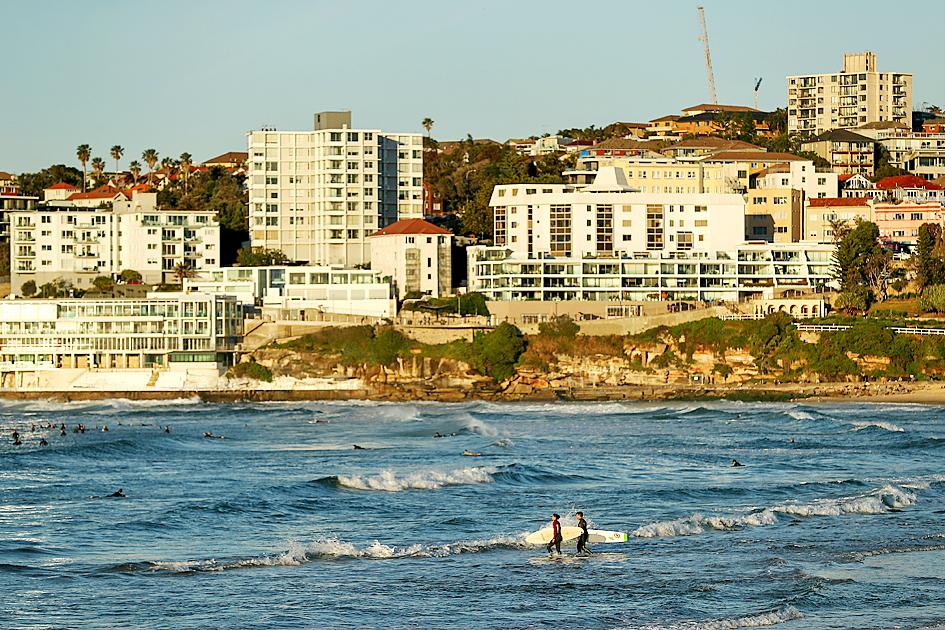Groundbreaking research by an Australian medic-surfer has uncovered a simple way to stop bleeding and save the life of someone who has had their leg bitten off by a shark.
Find the middle point between the hip and the genitals, make a fist and push as hard as you can. Shark attacks are rare, but on the increase in Australia, due in large part to more people being in the water.
Surfer and Australian National University medical school dean Nicholas Taylor set out to discover how to reduce fatalities in the event of an attack.

Photo: Bloomberg
Many fatal shark bites occur around the legs, leaving the victim to bleed to death despite making it back to shore.
In a study published by Emergency Medicine Australasia, Taylor found that a simple technique to compress the femoral artery was much more effective in stopping bleeding than traditional tourniquets.
His study showed that by making a fist and pressing down on the artery about 89.7 percent of blood flow was stopped, versus 43.8 percent using a surfboard leash as a makeshift tourniquet. The technique worked equally well with the patient wearing a wetsuit and without.
“I knew from my background in emergency medicine if people have massive bleeding from their leg, you can push very hard on the femoral artery and you can pretty much cut the entire blood flow of the leg that way,” he said in a statement released yesterday by the university.
“It is easy to do and easy to remember — push hard between the hip and the bits and you could save a life,” he said.
Taylor hopes the technique will become widely known among Australia’s about 500,000 surfers, for whom shark encounters are less uncommon.
“I want posters at beaches. I want to get it out in the surf community. I want people to know that if someone gets bitten you can pull out the patient, push as hard as you can in this midpoint spot and it can stop almost all of the blood flow,” he said.

POLITICAL PRISONERS VS DEPORTEES: Venezuela’s prosecutor’s office slammed the call by El Salvador’s leader, accusing him of crimes against humanity Salvadoran President Nayib Bukele on Sunday proposed carrying out a prisoner swap with Venezuela, suggesting he would exchange Venezuelan deportees from the US his government has kept imprisoned for what he called “political prisoners” in Venezuela. In a post on X, directed at Venezuelan President Nicolas Maduro, Bukele listed off a number of family members of high-level opposition figures in Venezuela, journalists and activists detained during the South American government’s electoral crackdown last year. “The only reason they are imprisoned is for having opposed you and your electoral fraud,” he wrote to Maduro. “However, I want to propose a humanitarian agreement that

ECONOMIC WORRIES: The ruling PAP faces voters amid concerns that the city-state faces the possibility of a recession and job losses amid Washington’s tariffs Singapore yesterday finalized contestants for its general election on Saturday next week, with the ruling People’s Action Party (PAP) fielding 32 new candidates in the biggest refresh of the party that has ruled the city-state since independence in 1965. The move follows a pledge by Singaporean Prime Minister Lawrence Wong (黃循財), who took office last year and assumed the PAP leadership, to “bring in new blood, new ideas and new energy” to steer the country of 6 million people. His latest shake-up beats that of predecessors Lee Hsien Loong (李顯龍) and Goh Chok Tong (吳作棟), who replaced 24 and 11 politicians respectively

Young women standing idly around a park in Tokyo’s west suggest that a giant statue of Godzilla is not the only attraction for a record number of foreign tourists. Their faces lit by the cold glow of their phones, the women lining Okubo Park are evidence that sex tourism has developed as a dark flipside to the bustling Kabukicho nightlife district. Increasing numbers of foreign men are flocking to the area after seeing videos on social media. One of the women said that the area near Kabukicho, where Godzilla rumbles and belches smoke atop a cinema, has become a “real

Archeologists in Peru on Thursday said they found the 5,000-year-old remains of a noblewoman at the sacred city of Caral, revealing the important role played by women in the oldest center of civilization in the Americas. “What has been discovered corresponds to a woman who apparently had elevated status, an elite woman,” archeologist David Palomino said. The mummy was found in Aspero, a sacred site within the city of Caral that was a garbage dump for more than 30 years until becoming an archeological site in the 1990s. Palomino said the carefully preserved remains, dating to 3,000BC, contained skin, part of the